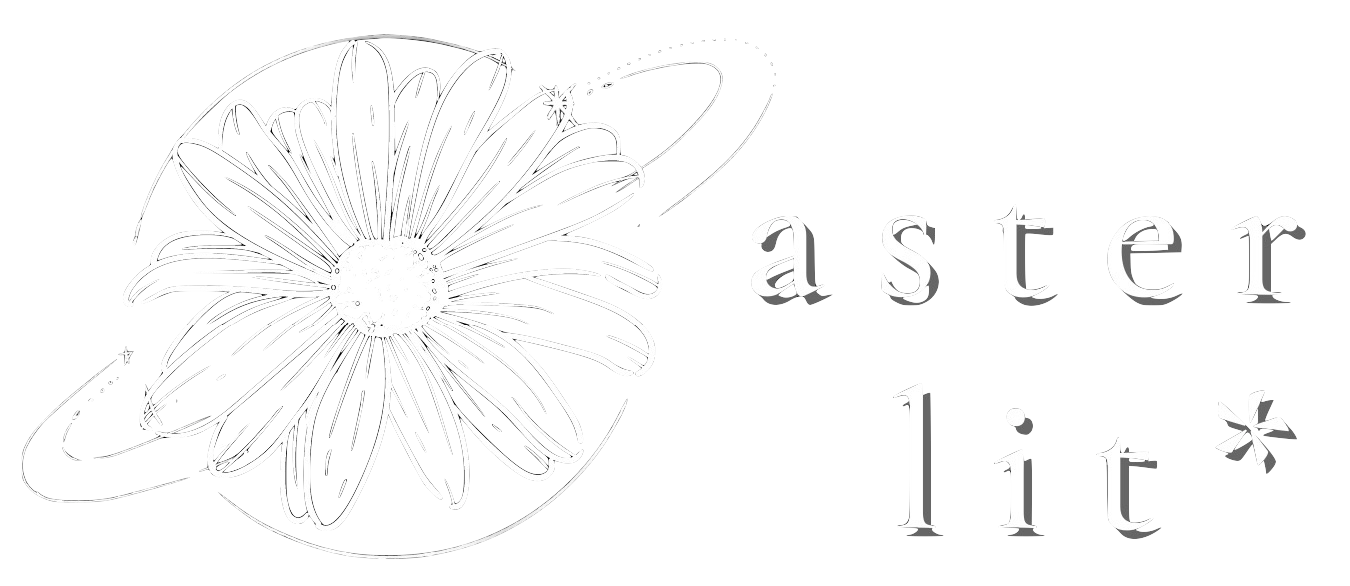
Aster Lit: Paradox
Issue 9—Summer 2023
Cry, Dad
Andrew Yuan, United States
Porch One
Sometimes, I think the town doesn’t want us here.
At Jones Creek, we left our shoes dangling by the laces from a tree branch and rolled our jeans up to our knees. Mud in between my toes and smooth rocks like stream’s knobby knuckles punched up at the bottoms of my feet. I cursed myself and Walmart for the white jeans belted around my eleven-year-old hips. I wanted to sit in the water completely. I wanted to get muddy.
My sister pulled a crawdad out of the water, grabbing it with two fisted hands. It died immediately, to her confoundment and remorse. But she got over it quickly and tucked the dead crustacean into her front overall pocket, head poking out to let its little beady eyes stare out at the world beyond the denim. The water was waist-high for my sister. She continued traipsing through the algae thick water, holding up stones and leaves in front of the dead crawdad’s face, a little one-sided game of show-and-tell.
At lunchtime, we went to Miss Lillian’s, the queen of the leftovers will make a nice sandwich. Everything about Miss Lillian was just a little too much. Her hair was too white, like the lights switched on in the middle of the night. Her voice was too loud, like she was trying to talk to a yard full of people. The food she cooked was too salty or too soft or softened in your mouth a little suspiciously. And her toothless dog was too dead to be alive. It lay limply in Miss Lillian’s lap, looking deflated at the muggy July afternoon. Miss Lillian, oblivious to the dog’s misery, patted his head in a constant patpatpat with her chubby hand. We always had lunch on her porch because of cold turkey and carrot stew sandwiches and her story about her great great great great grandpa the treasure hunter, which she told every afternoon. It was a story that was a little too easy to believe.
It goes like this: Great Great Great Great Grandpa wrestled bears and caught catfish the size of a human child with just his hands but that got boring. So he started digging, to see what was underneath the town of almost three hundred. Turns out the skeleton of Taylor— under the earthen muscle of soil and appendages of houses with stucco siding and protruding porches— was made from chalky arrowheads.
“I want to be a treasure hunter, too, Miss Lillian,” My sister said.
I looked at the gopher holes in the lawn, “I thought treasure was buried and x marked on a map. Did your great great great great grandpa have a xmarksthespot map?”
“Sometimes treasure is something that’s just been left behind.”
“But you wouldn’t leave behind something important. Right?”
“No. No one leaves behind important things,” Miss Lillian replied, patpatpat on her dog’s balding head.
Sometimes I imagine the town like a stretch of skin. I think about the arrow heads stabbing all over like a thousand spider bites on the dark thighs of our town. Sometimes, I feel like we are all living on someone else’s wound. My sister bounded two steps at a time down Miss Lillian’s porch steps, holding the crawdad, looking a little too red, by her side like a doll. Miss Lillian gives me sandwiches in tin foil to bring to the Murphy’s.
Sometimes, I think the town doesn’t want us here. I don’t mean our neighbors, I mean the muddy water, the dwarf pawpaw sprouts clustering nervously by the well, the forest that whispers and howls like it’s tuning itself for a nightmare.
Porch Two
The Murphy’s lived in a tall house with a wrap-around veranda. The house itself had charred slats of wood siding, and burnt, sang stains hinting at a house fire from not so long ago. There was Mr. Murphy, the officer of something; he had an outdated uniform and a mustache that never grew. Then there was the can't-go-inside-son. He seemed somehow bound to the railed-in confines of the shadowy porch. He never went farther than the last step to the front walk and never went inside the house. When I did my paper route in the early mornings, when the heat hadn’t even hit yet, there he was crossed legged on the creaky wood of the veranda. When my sister and I went out to catch lightning bugs, jars, nets, and plastic magnifying glasses in tow, there he was still, lying on his back watching the stars through a burnt hole in the wood of the awning over the porch.
Mr. Murphy assured me he had a wife, that she was inside. But I never saw her. Every afternoon around the same time the smell of burnt toast and a womanly shriek came from inside the house. That was the only proof I had of Mrs. Murphy.
We sat on the long, blackened porch steps. I sat between my sister, her crawdad set on the wood next to her, and the can’t-go-inside-son, while Mr. Murphy stood in front of us and taught us about fire safety. This was the thanks we got for bringing over the stew sandwiches. Sometimes, his chainsaw mistress would sit with him, in place of Mrs. Murphy. We fed her well too.
“Most house fires are one hundred percent preventable as long as the proper precautions are taken and proper safety information is imparted on young minds. First off, a fire extinguisher should be present in every kitchen. And of course, you want to be able to distinguish between an ordinary fire and a grease fire.”
“Mr. Murphy, tell us about the 1910 fire,” my sister said. She knows what she wants. “Well there’s not much to tell, is there?”
“Tellittellittellit” we chanted. We loved this story, we found it very exciting. Fires are very exciting.
“In the old times there was a fire at the schoolhouse and it spread like a blight till every single house was burning and—”
My sister got excited, “All the families stood on the train tracks watching the town become one big monster and—”
And so did I, “and there was nothing else for them here, their houses all burned up so they got on the train and never came back and then,” I slow myself down, forgetting how the rest of the story goes, “and then... and then what, Mr. Murphy?”
“And then not much. At least not for a bit.”
“Then how can we be here?” my sister asked, swishing her feet through a clump of burnt dandelions that confetti into ash on impact.
“Well there were some daughters and sons and nieces and nephews that lived wherever their parents ended up and they weren’t happy there. Sometimes, you are from a place and nowhere else can really be a home. So these daughters and sons and nieces and nephews took the train back and they built everything again. They built everything exactly as it was. From the burnt shadows of their old homes, the ash blueprints left on the dirt, they made replica houses of wood and brick and stones to take the place of the ghost houses that the fire had left behind.”
“But we have fire extinguishers now, so we won’t have to build the same houses for a third time, right?”
“That’s right.”
“But Mr. Murphy, your house is burnt all over.”
“No, it’s not. Our house is fire-safe.”
“Mr. Murphy, right there it is all black and look at the ceiling there's a big old hole.”
“I don’t see anything there. It must be the shadows. It’s getting late.”
Mr. Murphy disappeared into the house.
“Hot!” my sister hissed, dropping the crawdad on the grass. I saw steam sizzling off of its pink belly.
I could hear the forest clinking silver spoons on crystal glasses and asking for a toast, so I knew it was time for dinner. Sometimes, the town seems resentful of us, but I can’t ever put a finger on it.
Porch Three
We have two graveyards here. The normal one and the yellow fever one with no names. On the porch overlooking the yellow fever graveyard, we had dinner every night. It was a perpetual lesson in table manners. The table was the longest thing I had ever seen. It was covered in food that shimmered in the moonlight and intricate settings of spoons and forks decreasing in size, silver goblets and crystal glasses and napkins folded like swans inside the shallow soup bowls.
Often, my wan uncles debated over who came here first. Those were funny barbarians, they croaked, with funny names and funny colored skins. I wonder if they looked at me or my sister. Of course they would bring it up on Thanksgiving.
At dinner, there are always many well-dressed people that scream-laugh at jokes I don’t understand and tell me “pinky out!” when I take a drink. The yellow fever graveyard and the porch overlooking it always erupt in festivities once it gets dark. A hoary dog with a leftover sandwich in its mouth danced on the bones beneath the big old hole. The chainsaw never left.
My sister and I are always underdressed.
The thing about these dinners is that no matter how much I ate, I was never full. And I could never remember anyone’s name. And the music they played didn’t seem to be coming from anywhere.
My sister and I sat next to each other. Pinky up! Pinky up! Someone hissed at us.
“Could I have this dance?” a man asked my sister’s crawdad. The crawdad was big now, wearing a pink dress, walking like a person. It daintily took the gentlemen’s hand.
I made my rounds through the groupings of people on the porch. “How are you?” I asked
“Positively feverish!” And they all laughed, “we pronounce us the most whimsical leftovers of all! Look at the oxblood river – it’s the chemicals again!”
I don’t get the joke. I never get the joke.
Sometimes, I don’t think the town wants us here. In the evening when we walk home, the yellow fever graveyard becomes swampy and whispery. Sometimes, I think it is asking a question. A question like would you leave something important behind? The mud from the yellow fever graveyard never washed off our boots. Halfway home, we had to turn around. My sister had forgotten her crawdad on the porch.
Andrew Yuan (he/they) is a junior from Phillips Exeter Academy. He is a contributor to South China Morning Post and a prose/poetry editor for Surging Tide Magazine, Kalopsia Lit and The Metaphysical Review. He is a former Executive Editor of Cathartic Lit. His writing has won three national gold medals and one silver medal at the National Scholastic Arts and Writing Awards. His journalistic pieces have been featured on The Boston Globe, The Portsmouth Herald, and Foster’s Daily Democrat. He is an alumnus of Iowa Young Writers’ Studio Residential Workshop and Adroit Journal Summer Mentorship Program.
